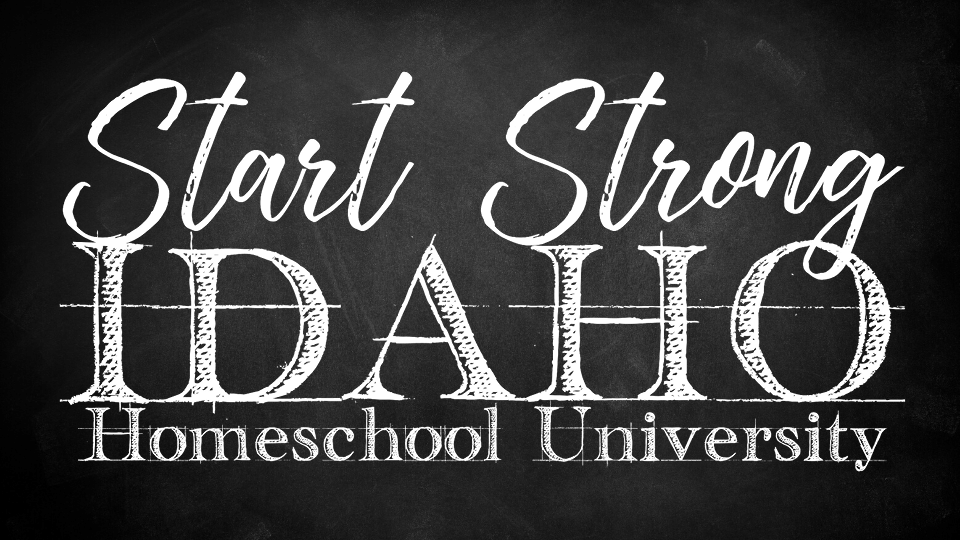Getting Started
Ready to Start Homeschooling?
Congratulations on your decision to homeschool! A custom education at home is a beautiful gift to give your child.
Starting your homeschool journey can be overwhelming. So take a deep breath. Remember that as a parent, you are already at an advantage. Why? Because no one knows your child like you do.
Your homeschool will be exactly that: YOUR homeschool. It won’t look exactly like anyone else’s homeschool, because your family isn’t exactly like anyone else’s family.
We’ve got some great resources to help you in these early stages as you wade through the many options available.
Are you overwhelmed at the idea of homeschooling?
Ever wish you could sit down with an expert and get answers to all of your questions?
Homeschool Idaho has answers for all of those questions in Homeschool University! We’ve been empowering families to teach their children at home for almost 30 years—since the early days of the modern homeschool movement. Homeschool Idaho is the authority on homeschooling in Idaho and we will help you take the guesswork out of what to do and where to start.
Available now, this unique 14-day online course is designed to help new homeschoolers take flight. It includes videos, articles, and panel discussions with veteran homeschoolers who will walk you step-by-step through all the facets of successfully homeschooling your kids. You will love all the practical help and guidance. We’ve also included hours of bonus content to help you dig deeper into individual topics.
Idaho Law
Get all the details on Idaho’s homeschool law.
Teaching Methods
A quick guide to finding curriculum that is a good fit for your family.
Learning Styles
Do you know your child’s learning style?
Join Our Discussion Group
Connect with other Idaho homeschool parents.
Suggested Websites
Additional resources to help you on your homeschool journey.
New! Getting Started Video Series
Our Getting Started Homeschool Video Series is designed to give you all the information you need to start your homeschool journey. Each session of this 10 part series covers a stand-alone topic (Idaho law, who should homeschool, parenting, learning styles, highschool, etc.), so feel free to watch them all or simply pick-and-choose the video that covers the area you need help with.
Then, if you have any questions, send them to us at info@homeschoolidaho.org with “Getting Started” in the subject line and we will address them in future videos.
Part 1: Homeschooling Overview
Part 2: Who, Why, and When
Part 3: Homeschool Parenting
Part 4a: Learning & Teaching Styles
Part 4b: Learning & Teaching Styles
Part 5: Homeschool Schedule
Part 6: Homeschool Curriculum
Part 7: Homeschool Organization
Part 8: Teaching Multiple Grades
Part 9: Homeschool High School
Part 10: Homeschool in Real Life
FAQs
Frequently Asked Questions on Homeschooling
What exactly IS homeschooling?
What are the advantages to homeschooling?
- Parents are able to tailor a curriculum and course of study to their child’s individual abilities, learning style, needs, and future goals.
- Parents have greater opportunity for character training with their children.
- Parents are able to choose the worldview through which they will teach their children.
- Parents have the flexibility to move at the child’s pace, spending more time or less time mastering particular concepts or subjects.
- Children receive one-on-one tutorial-style teaching.
- Children have more time to pursue areas of interest.
- High school students can jump-start their college education or career preparation.
- Learning together builds strong family relationships.
- Learning becomes a lifestyle.
What about socialization?
Many homeschoolers have discovered healthy socialization takes place when children are exposed to people of all ages in the community, rather than being limited to a classroom and a group of students all about the same age. Children learn social skills in everyday activities such as trips to the grocery store or library, visits with grandparents, church activities with friends, support group activities, park days, and community activities. Most importantly, children often receive their most valuable socialization in the nurturing environment of home and family.
Will homeschooling make my kids weird?
How much does it cost to home educate?
- The type of curriculum and resources you choose to purchase.
- The amount and type of extracurricular activities in which your child participates.
- Field trips you choose to take.
Home education is an investment – a very worthy investment — in your children and their future!
How much time does homeschooling take?
Homeschooled students don’t have to take time to change classes or travel to and from a school, so they can proceed at their own pace. In elementary years especially, parents and children often find that they may only need a few hours to accomplish their work for the day.
I don't have a teaching degree. Can I really teach my child?
Research and practical experience show that it is dedication and hard work, not special training, that produce outstanding educational results in a homeschool setting.
Can a child with special needs be homeschooled?
How will my homeschooled child receive a diploma?
Home educated students are not required to take any of the state-mandated tests that are required for public school graduation.
There are many factors that you will want to consider, depending upon the path that your child wants to take upon graduating from homeschool. Click over to our Homeschooling through Highschool page for more detailed information.
Is a homeschool graduate eligible for college admissions, grants, and scholarships?
Stanford describes itself as “eager to embrace” homeschoolers because the “the brightest homeschoolers bring a mix of unusual experiences, special motivation, and intellectual independence that makes them a good bet to flourish in college.”
Universities appreciate our student’s strong work ethic, as well as their preparedness for college level courses. Most colleges accept parent-generated transcripts, especially when the scores on college entrance exams substantiate the student’s grade point average.
Click over to our Homeschooling through Highschool page for more information.
